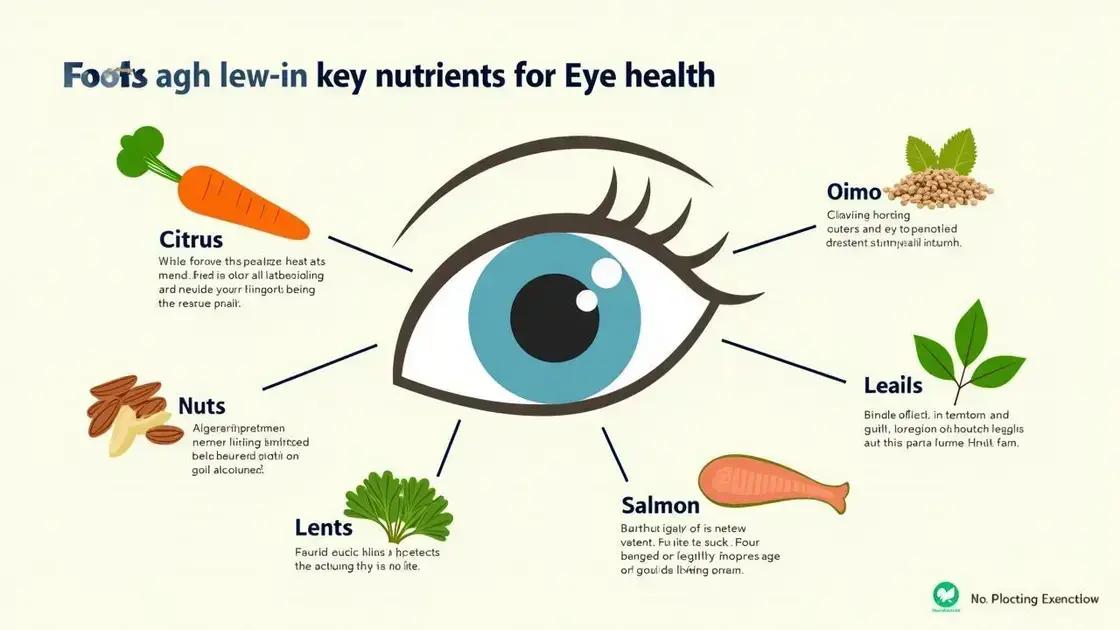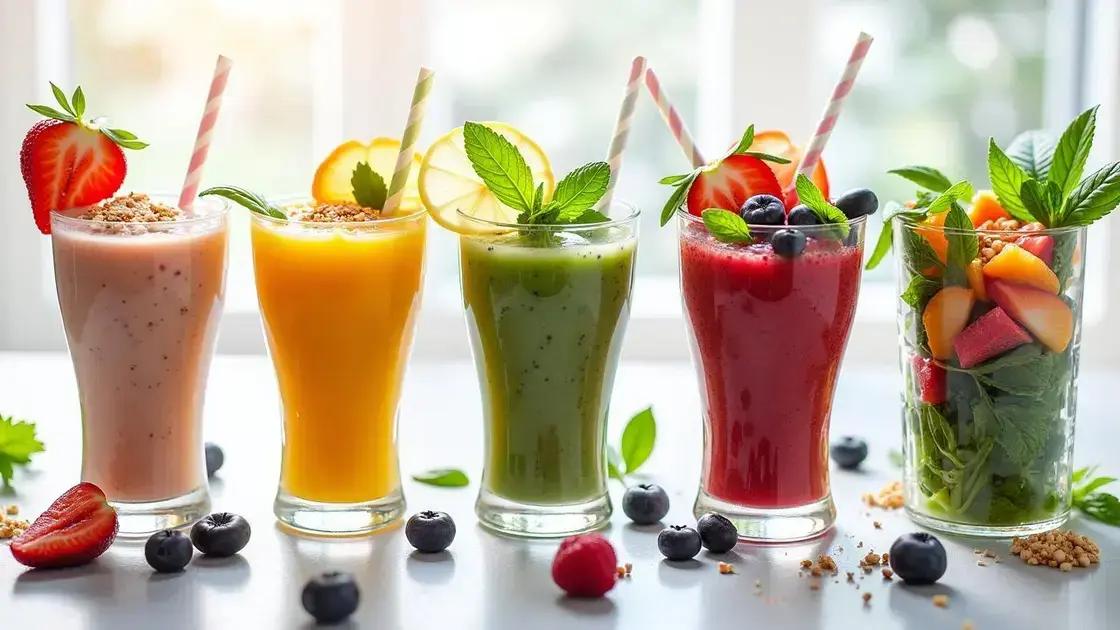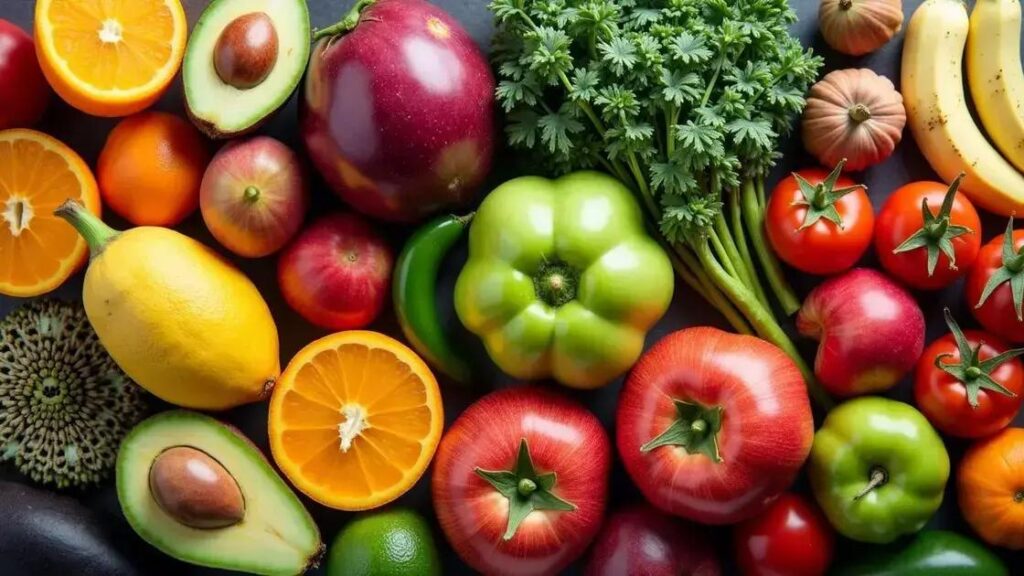Maintaining sharp vision involves a combination of proper nutrition and lifestyle choices. Include nutrients like vitamins A, C, and E, along with Omega-3 fatty acids in your diet, and adopt healthy habits such as regular eye exams, taking screen breaks, and protecting your eyes from UV rays.
Maintaining clear vision is essential for enjoying life. How to keep your vision sharp with nutritional support is a key topic for anyone concerned about their eye health. Nutrition plays a vital role in protecting our eyes from deterioration and enhancing our overall well-being. In this article, we will discuss the important nutrients for your eyes, how to include them in your diet, and additional lifestyle tips that promote better vision.
Understanding the Link Between Nutrition and Vision

Nutrition plays a crucial role in maintaining eye health. Many people may not realize that what we eat directly impacts our vision. Understanding the link between nutrition and vision involves recognizing how certain nutrients can affect our eyes.
Our eyes require specific vitamins and minerals to function properly. For instance, Vitamin A is well known for its role in preventing night blindness. It is essential for the health of the retina, allowing us to see in low light conditions. Foods rich in Vitamin A include carrots, sweet potatoes, and leafy greens.
Additionally, Omega-3 fatty acids are important for eye health. These healthy fats help prevent dry eyes and are associated with a lower risk of age-related macular degeneration. Incorporating fish like salmon and walnuts into your diet can boost your intake of Omega-3s.
Antioxidants and Eye Health
Antioxidants also play a significant role in protecting our eyes from damage caused by free radicals. Vitamins C and E, as well as lutein and zeaxanthin, are powerful antioxidants that help combat oxidative stress in the eyes. You can find these nutrients in colorful fruits and vegetables, such as oranges, spinach, and Brussels sprouts.
Furthermore, a balanced diet is vital for maintaining good eye health. Consuming a variety of nutrient-dense foods ensures that you provide your body with all the essential elements it needs to protect your vision.
In summary, the connection between nutrition and vision is undeniable. By focusing on a diet rich in vitamins, minerals, and antioxidants, you can significantly improve your chances of keeping your vision sharp as you age.
Top Nutrients for Eye Health

To maintain excellent eye health, it’s essential to include certain nutrients in your diet. These nutrients not only help protect your eyes but also enhance your vision. Here are some of the top nutrients for eye health:
1. Vitamin A: This vitamin is vital for night vision and overall eye health. It helps maintain the health of the retina and is found in foods like carrots, sweet potatoes, and spinach.
2. Vitamin C: An antioxidant that helps protect the eyes against damage. Vitamin C supports the health of blood vessels in the eyes. Citrus fruits, strawberries, and bell peppers are excellent sources.
3. Vitamin E: Another powerful antioxidant, Vitamin E helps protect cells in the eyes from damage by free radicals. You can find it in nuts, seeds, and vegetable oils.
4. Lutein and Zeaxanthin: These carotenoids are found in high concentrations in the retina. They filter harmful blue light and protect against macular degeneration. Foods such as kale, spinach, and peas are rich in these nutrients.
5. Omega-3 Fatty Acids: Essential fatty acids play a role in eye health by preventing dry eyes and supporting retinal health. Salmon, mackerel, and walnuts are excellent sources of Omega-3s.
6. Zinc: This mineral helps the body absorb Vitamin A and is vital for maintaining the health of the retina. Foods rich in zinc include meat, shellfish, lentils, and beans.
Incorporating these nutrients into your daily meals can significantly contribute to maintaining healthy eyes. Aim for a balanced diet to support your vision and overall health.
Creating a Vision-Boosting Meal Plan

Creating a vision-boosting meal plan is essential for maintaining eye health. A well-structured meal plan focuses on including foods rich in vitamins, minerals, and antioxidants that support clear vision and overall eye function. Here are simple steps to help you build your meal plan:
1. Start with Breakfast: Include foods high in Vitamin A and Omega-3 fatty acids. A smoothie with spinach, banana, and flaxseed can provide a nutritious start. Alternatively, opt for scrambled eggs with diced tomatoes and whole-grain toast.
2. Healthy Lunch Options: Think about a salad loaded with kale, bell peppers, and carrots as a base. Top it with grilled salmon or chickpeas for added protein and Omega-3s. Drizzle with lemon juice for a refreshing twist.
3. Nutritious Snacks: Keep snacks easy and eye-friendly. Consider snacking on carrots and hummus, walnuts, or a handful of berries. These options help provide essential nutrients while keeping hunger at bay.
4. Wholesome Dinners: For dinner, try recipes that incorporate a variety of colored vegetables. A stir-fry with broccoli, red bell peppers, and shrimp served over brown rice is both delicious and nutritious. Don’t forget a side of mixed greens!
5. Think Hydration: Water is vital for maintaining moisture in the eyes. Aim to drink plenty of water throughout the day. Herbal teas are also a great option, as they can provide additional antioxidants.
Keep your meal plan balanced by incorporating different food groups to ensure you are getting all the essential vitamins and minerals. Keeping variety in meals will help support not only your eyesight but overall health.
Lifestyle Tips to Support Healthy Eyes

Supporting healthy eyes goes beyond nutrition. It includes making lifestyle choices that protect and enhance your vision. Here are some practical lifestyle tips to support healthy eyes:
1. Take Regular Breaks: Follow the 20-20-20 rule. Every 20 minutes, look at something 20 feet away for at least 20 seconds. This helps reduce eye strain, especially when using screens.
2. Wear Sunglasses: Protect your eyes from harmful UV rays by wearing sunglasses that block 100% of UVA and UVB rays. This reduces your risk of cataracts and other eye problems.
3. Maintain a Healthy Weight: Being overweight increases the risk of diseases like diabetes, which can lead to vision loss. Stay active and aim for a balanced diet to maintain a healthy weight.
4. Stay Hydrated: Drinking enough water is essential for overall health, including eye health. Proper hydration helps keep your eyes moist and reduces dryness.
5. Quit Smoking: Smoking increases the risk of developing eye diseases like macular degeneration and cataracts. Quitting smoking can have a positive impact on your eye health.
6. Get Regular Eye Exams: Visiting an eye care professional for regular checkups allows for early detection of any potential eye problems. This is crucial for maintaining good vision.
7. Limit Screen Time: Too much screen time can lead to digital eye strain. Use blue light filters, reduce glare, and set limits on how much time you spend in front of screens.
Incorporating these tips into your daily routine can significantly benefit your eye health. Being proactive about your lifestyle will help you maintain sharp vision for years to come.
Protect Your Vision with Nutrition and Lifestyle Changes
In conclusion, keeping your vision sharp is an attainable goal through proper nutrition and healthy lifestyle choices. By incorporating essential nutrients into your diet, such as vitamins A, C, and E, along with Omega-3 fatty acids, you can significantly enhance your eye health.
Moreover, implementing simple lifestyle tips—like taking regular breaks from screens, wearing sunglasses, and staying hydrated—can further support your eyesight. Remember, regular eye exams are crucial for maintaining clear vision and identifying potential issues early.
By following these guidelines, you will not only safeguard your vision today but also pave the way for a brighter future. Stay proactive, and make eye health a priority in your daily life.
FAQ – Frequently Asked Questions about Maintaining Eye Health
What role does nutrition play in eye health?
Nutrition is vital for eye health. Nutrients like vitamins A, C, and E, along with Omega-3 fatty acids, help protect against vision loss and maintain clear eyesight.
How can I create a meal plan to support my vision?
To create a vision-boosting meal plan, include foods rich in essential nutrients, such as leafy greens, colorful fruits, and fatty fish, while ensuring a balanced diet.
What are some lifestyle tips for healthy eyes?
Some lifestyle tips include taking regular breaks from screens, wearing sunglasses to protect against UV rays, staying hydrated, and quitting smoking.
How often should I get my eyes examined?
It is recommended to have a comprehensive eye exam every 1-2 years, or more frequently if you have existing eye conditions or concerns.
What is the 20-20-20 rule?
The 20-20-20 rule suggests that every 20 minutes, you should look at something 20 feet away for at least 20 seconds to reduce digital eye strain.
Can eye strain lead to long-term vision problems?
While eye strain itself does not cause permanent damage, it can contribute to discomfort and worsen existing vision issues. Regular breaks can help alleviate this.













